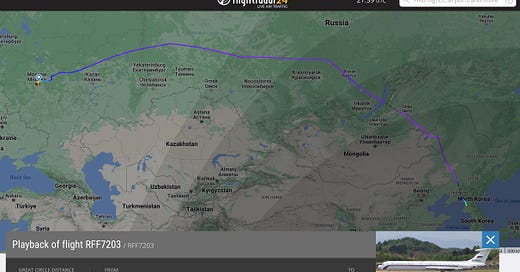NK-Russian military ties perhaps to expand; Iran exports one million bpd of oil to PRC; Iran and Syria setting up joint bank; Iranian money changers facing pressure
Prohibited Transactions for the week of 31 July 2023 (#15)
//Hi everyone, thanks as always for reading! I hope you’ve been finding the newsletter useful. With the usual summer slow down of news coming out of the DPRK and Iran, I will be taking a two week publishing break. The next issue of Prohibited Transactions will come out on 25 August 2023. Until then!
North Korea
Following the recent visit by Russia’s defense minister to North Korea, a Russian military plane traveled to North Korea on 1 August 2023, staying on the ground at Pyongyang International Airport for approximately 36 hours. //The type of plane is used for military delegations, so it’s unlikely to have transferred any weapons systems, however it is not known if other goods or money were transferred An official with the US National Security Council said that North Korea is considering providing additional military support to Russia — in the form of munitions — which would likely result in new sanctions imposed on the two nations.
Moscow and Pyongyang have the motivation to cooperate with each other, but it’s unclear if they will break away from the status quo of Russia keeping a bit of distance from the DPRK, despite all the public messaging of support between the two countries.
Ukrainian forces appear to have captured North Korean munitions that were being used by invading Russian forces, and have turned the captive rockets onto Russian positions.
North Korean traders attempting to restart trade with their Chinese counterparts are still facing roadblocks from the government, as Pyongyang is requiring trading companies to import machinery and other supplies for factories, in addition to their original trading plan. //Perhaps another sign of the state of the DPRK’s economy, as the government is looking at any way to reinvigorate local economies.
Iran
In 2023, Iran has been exporting approximately one million barrels per day (bpd) of oil to the PRC, as compared to 325,000 bpd in 2020. The purchasers of Iranian oil are primarily Chinese private refineries, and not the state-owned refineries.
Major Chinese and Russian companies are refraining from doing business with Iran’s oil industry due to international sanctions. //Perhaps it’s more correct to say they are refraining from overtly doing business with Tehran, while likely purchasing Iranian oil that has been rebranded as coming from Malaysia or other countries.
Iran and Syria have announced the launching of a joint bank //How long until it is sanctioned? and joint insurance company between the two countries, which will help facilitate the activities of Iranian businesses and traders in Syria. There is also talk of the two sides establishing a joint free trade zone.
A small US-incorporated cloud service company, Cloudzy, has been providing state-sponsored hackers — from the PRC, India, Iran, DPRK, Pakistan, Russia, Vietnam and Israel — with internet services. Cloudzy is likely a cutout for a Tehran-based hosting company, abrNOC.
Following Washington’s recent decision to ban 14 Iraqi banks from using US dollars (see Issue #13), small protests have occurred outside of the Central Bank of Iraq, demanding Baghdad intervene as the Iraqi dinar falls. A Tehran-backed Iraqi militia group has also threatened violence against US forces in Iraq because of Washington’s ban.
An Iranian legislator is pushing the government to resolve the issue of the USD7 billion being held in South Korean banks. //This money, previously discussed in Issue #6, has been a longstanding issue between the two nations, and the US. Seoul clearly doesn’t want the money and all the hassles that come with it, while Tehran can do nothing about retrieving the funds.
As sanctions pressure continues in Iran, money changers are coming under increased scrutiny.



